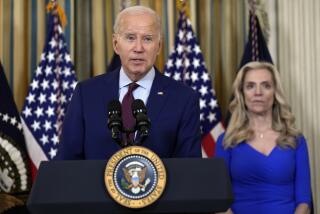White House unveils new initiatives to curb online piracy

The White House unveiled new antipiracy initiatives and is calling for more cooperation in the fight against intellectual property theft from search engines, data storage services and domain name registrars.
The initiatives are an expansion of the Obama administrationâs 3-year-old program aimed at curbing piracy of movies, TV shows, music and other copyright materials.
The White House will also seek greater cooperation from other countries where piracy is rampant.
PHOTOS: Hollywood Backlot moments
U.S. Intellectual Property Enforcement coordinator Victoria Espinel said the administration needs to be more âthoughtful and forcefulâ when it comes to cracking down on piracy. Known as the âIP czar,â Espinel said, âWe want to make piracy and counterfeiting online less attractive of a business.â
The report expands calls on third parties to take steps to reduce infringement online and in the regular marketplace. Espinel said she will reach out to the Internet companies.
Rights-holders and content creators have long called for tougher regulation of infringement online.
âWe applaud the strong leadership coming out of the White House to assure that American ingenuity and innovation generate jobs in the U.S., not profits for organized criminal activities stealing our intellectual property,â said Rick Cotton, executive vice president and general counsel for NBCUniversal.
Rampant online piracy has been a scourge of the independent film industry, which praised the administrationâs efforts.
PHOTOS: Internet protests 2012 anti-piracy bills
âWe are especially encouraged by the call for further voluntary industry understandings and standards, which have emerged as a promising method to enhance the integrity of the online marketplace for copyrighted content,â said Jean Prewitt, president of the Independent Film & Television Alliance, a trade group that represents independent production and distribution companies.
The White House report touted progress in getting many third parties to agree to such best practices. For example, Internet service providers have agreed to notify Web subscribers when their accounts appear to have been used for online piracy.
Payment services including American Express, Discover, MasterCard, PayPal and Visa have also agreed to step up antipiracy efforts, the report said.
Rights-holder groups have called for more pressure to be put on search engines and other Internet companies to curb piracy.
âThe White House appropriately recognizes that search engines need to be part of that conversation,â Cary Sherman, chairman and chief executive of the Recording Industry Assn. of America, said in a statement. âBut the continuing prominence of rogue websites in the first page of results shows that this continues to be a real problem.â
The 2008 antipiracy law, called the Prioritizing Resources and Organization for Intellectual Property Act, created the position of the intellectual property enforcement coordinator.
ALSO:
Americans watched 41 billion online videos in May
Ad crowd-sourcing start-up Tongal will now do music videos
Selma Blair off of âAnger Managementâ after clash with Charlie Sheen
Twitter: @rfaughnder
More to Read
From the Oscars to the Emmys.
Get the Envelope newsletter for exclusive awards season coverage, behind-the-scenes stories from the Envelope podcast and columnist Glenn Whippâs must-read analysis.
You may occasionally receive promotional content from the Los Angeles Times.











